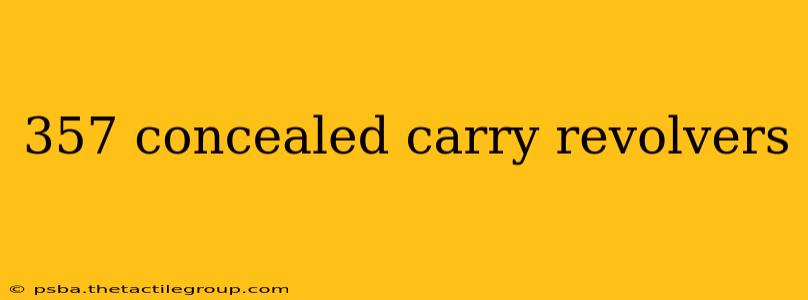Choosing a concealed carry revolver chambered in .357 Magnum requires careful consideration of several factors. This powerful cartridge demands a firearm that can handle its recoil while remaining comfortably concealable. This guide explores the key aspects to consider when selecting a .357 Magnum revolver for concealed carry, including firearm features, ammunition selection, and training requirements.
Why Choose a .357 Magnum Revolver for Concealed Carry?
The .357 Magnum offers significant stopping power, making it a popular choice for self-defense. Its larger cartridge delivers substantially more energy than many smaller calibers, increasing the likelihood of stopping a threat quickly and effectively. However, this power comes at a cost – increased recoil and a larger, heavier firearm.
Key Features to Look for in a Concealed Carry .357 Magnum Revolver
Several features are crucial for a successful concealed carry .357 Magnum:
1. Barrel Length:
Shorter barrels are generally preferred for concealed carry due to their ease of concealment. However, shorter barrels can slightly reduce velocity and accuracy. Finding the right balance between concealability and performance is key. Consider barrel lengths between 2 and 4 inches.
2. Frame Size:
Smaller frame revolvers are easier to conceal, but they may have increased recoil. Larger frame revolvers offer better recoil management but are less concealable. Consider your hand size and shooting experience when choosing a frame size.
3. Weight:
A heavier revolver mitigates felt recoil, enhancing shootability. However, excessive weight compromises concealability. Strive for a balance between manageable recoil and comfortable concealment.
4. Sights:
High-visibility sights are essential for quick target acquisition in stressful situations. Night sights are particularly beneficial in low-light conditions.
5. Action Type:
Both single-action and double-action revolvers are available in .357 Magnum. Single-action revolvers require manual cocking of the hammer before each shot, while double-action revolvers allow for both single-action and double-action firing. The choice depends on personal preference and shooting style.
6. Cylinder Release:
A smooth and reliable cylinder release mechanism is crucial for quick reloading under pressure.
Ammunition Considerations for Concealed Carry .357 Magnum
Choosing the right ammunition is as important as choosing the right firearm. .357 Magnum ammunition offers a range of options, each with its own characteristics:
- .38 Special: This milder round can be fired in a .357 Magnum revolver, providing a reduced recoil option for practice or situations where less power is desired.
- .357 Magnum +P: +P ammunition offers increased power and velocity compared to standard .357 Magnum rounds, but it can increase recoil and potentially wear down the firearm faster. Use it judiciously.
- Self-Defense Loads: Several manufacturers offer specialized self-defense ammunition with features designed to enhance stopping power and expansion.
Always practice with the same ammunition you intend to carry for concealed carry.
Training and Practice: The Most Crucial Element
Regardless of the firearm chosen, rigorous training is paramount. The .357 Magnum's substantial recoil demands proficiency to manage it effectively and accurately. Regular practice with dry firing (always ensuring the firearm is unloaded) and live fire at the range is essential. Professional training from a qualified firearms instructor is highly recommended.
Conclusion: Making the Informed Choice
Selecting a concealed carry .357 Magnum revolver is a significant decision. Carefully consider the factors discussed above, prioritize safety, and invest in comprehensive training to ensure responsible and effective self-defense. Remember, the best firearm is the one you can shoot accurately and comfortably under pressure. This guide offers valuable information, but it’s crucial to handle and test any firearm before making a purchase. Always consult with a qualified firearms professional for personalized advice.

